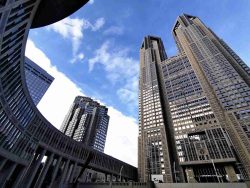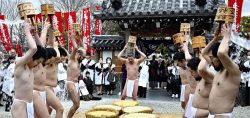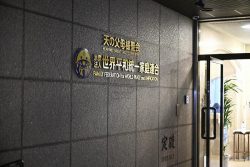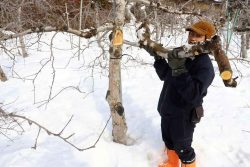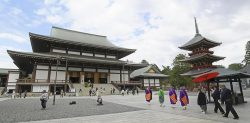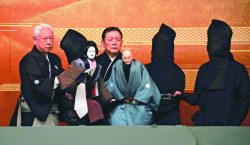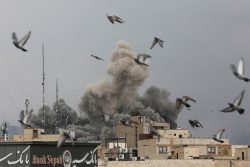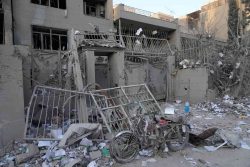Japan’s Hibakusha Speak Of Physical, Emotional Pain Caused by A-Bomb; One Helps With Medical Skill, One With English Skill

Keiko Ogura, center, and Masao Tomonaga, right, speak about their experiences as atomic bomb survivors during a forum at the University of Oslo on Wednesday.
18:05 JST, December 12, 2024
OSLO — Two hibakusha atomic bomb survivors on Wednesday called on members of younger generations to join forces for the abolition of nuclear weapons at a forum marking the winning of the Nobel Peace Prize by Nihon Hidankyo (Japan Confederation of A- and H-Bomb Sufferers Organizations).
At the event, a doctor from Nagasaki studying radiation’s aftereffects on human bodies and a Hiroshima woman who had spoken of her experiences to Ukrainian President Volodymyr Zelenskyy took the podium and stressed how inhumane nuclear weapons are.
The Norwegian Nobel Institute hosted the event, held at the University of Oslo. Both speakers gave their talks in English.
Radiation’s lifelong effects
Radiation continues to affect the bodies of atomic bomb survivors throughout their lives, Masao Tomonaga told an intently listening audience of students and others at the forum. Tomonaga, 81, is the honorary director of the Japanese Red Cross Nagasaki Atomic Bomb Hospital. He has long engaged in research on leukemia.
Tomonaga was 2 years old when he was exposed to radiation at his home, about 2.5 kilometers from the hypocenter in Nagasaki. Although he did not sustain any injuries, he saw many atomic bomb survivors suffering from leukemia after the war ended. Hoping to investigate the causes of the disease, he aspired to become a doctor, just like his father, and started studying health damage caused by atomic bomb radiation.
Tomonaga belongs to International Physicians for the Prevention of Nuclear War, which received the Nobel Peace Prize in 1985. He has given talks about his experience with medical care for atomic bomb survivors both at home and abroad. In 2017, he delivered a speech at a negotiation meeting for the Treaty on the Prohibition of Nuclear Weapons at U.N. headquarters in the United States. He still works as a doctor and examines atomic bomb survivors.
During the forum, Tomonaga said that elderly atomic bomb survivors are at risk of myelodysplastic syndrome, a bone marrow disorder that often develop into leukemia. He noted that victims also continue to suffer psychologically.
He concluded his speech by calling on those in younger generations to be aware of their responsibility to cooperate to realize a nuclear-free world, whether they live in nuclear-armed countries or nonnuclear ones.
Hating war itself
Keiko Ogura, 87, an atomic bomb survivor from Hiroshima who has been giving testimony in English, spoke about her experiences for about 10 minutes at the forum in Oslo, which she was visiting for the first time.
She expressed her wish to see a nuclear-free world in her own lifetime. She said that hibakusha can share their memories, but that action and cooperation by others — including her listeners — is necessary to stop wars and abolish nuclear weapons.
Ogura was exposed to radiation when she was 8 at a location about 2.4 kilometers from the hypocenter. Although her house’s ceilings and windowpanes were blown away, she did not sustain any major injuries and her family members were safe.
Her husband, Kaoru, whom she married in 1962, served as head of the Hiroshima Peace Memorial Museum in the city of Hiroshima, and guided many VIPs from abroad. But he died in 1979 at age 58.
Ogura, who was then a homemaker, began to receive requests from overseas to guide people around Hiroshima and work as an interpreter. So, she studied English on her own and founded a group of tour guides and interpreters, called the Hiroshima Interpreters for Peace, or HIP, in 1984.
At the Group of Seven summit meeting in Hiroshima in May last year, she described her experiences to Zelenskyy and the G7 leaders when they visited the peace memorial museum. She passionately conveyed the feelings of survivors that cannot be described with figures or photographs.
At the forum, she explained how survivors suffer from discrimination and emotional scars. She also said that in the course of her testimony activities she has often been asked whether she holds a grudge against the United States for dropping atomic bombs on Hiroshima and Nagasaki. Her response is to say that war itself is what she hates.
She stressed that the battle to eliminate nuclear weapons cannot be left to politicians alone, and called on her audience to play an active part. Her powerful speech met with loud applause from participants.
Top Articles in Society
-

Producer Behind Pop Group XG Arrested for Cocaine Possession
-

Man Infected with Measles Reportedly Dined at Restaurant in Tokyo Station
-

Woman with Measles Visited Hospital in Tokyo Multiple Times Before Being Diagnosed with Disease
-

Bus Carrying 40 Passengers Catches Fire on Chuo Expressway; All Evacuate Safely
-

Tokyo Skytree’s Elevator Stops, Trapping 20 People; All Rescued (Update 1)
JN ACCESS RANKING
-

Producer Behind Pop Group XG Arrested for Cocaine Possession
-

Japan PM Takaichi’s Cabinet Resigns en Masse
-

Man Infected with Measles Reportedly Dined at Restaurant in Tokyo Station
-

Israeli Ambassador to Japan Speaks about Japan’s Role in the Reconstruction of Gaza
-

Videos Plagiarized, Reposted with False Subtitles Claiming ‘Ryukyu Belongs to China’; Anti-China False Information Also Posted in Japan


